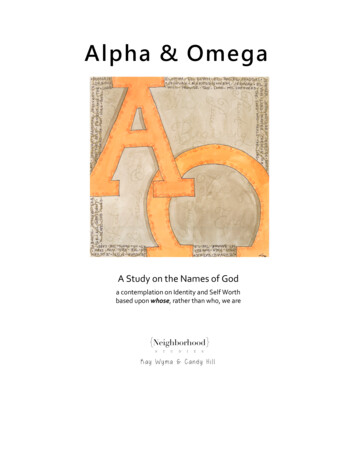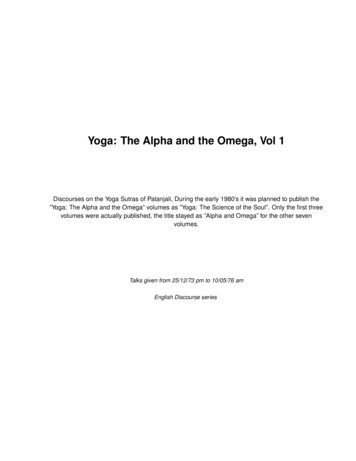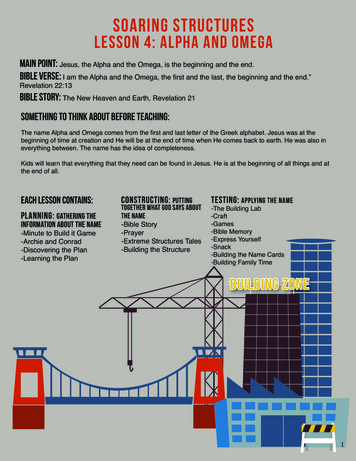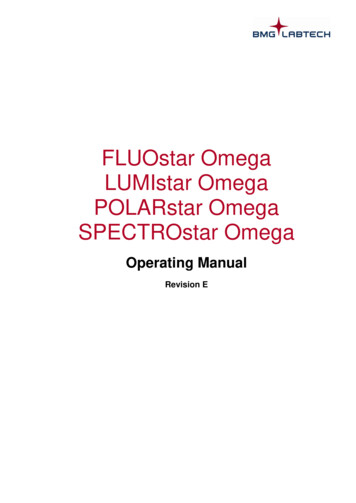
Transcription
Alpha & OmegaA Study on the Names of Goda contemplation on Identity and Self Worthbased upon whose, rather than who, we areKay Wyma & Candy Hill
There is something in every Name of God which may breed faith inour souls.Whether we know him as Jehovah, Elohim, Shaddai, or Lord, or bywhatsoever other name he has been pleased to manifest himself,that title becomes the ground of our confidence, and is the meansof fostering faith in his people’s minds, when they come tounderstand its meaning.To a trembling people the Lord enlarges on his wonderful names. Ithink he also does it to excite our wonder and our gratitude. Hethat loves us so much is Jehovah: he that can create and destroy;he that is the self-existent God; he, even he, has set his heart uponhis people, and loves them and counts them precious in his sight. Itis a marvelous thing.The more one thinks of it, the more shall he be overwhelmed withastonishment, that he who is everything should love us i- Charles SpurgeonCopyright 2018, Kay Wills Wyma
WEEK 1ElohimCreatorJehovah/YahwehSelf-Existent OneWEEK 2Jehovah JirehJehovah NissiThe LORD will ProvideThe LORD is our BannerWEEK 3El RoiJehovah RaphaGod Who SeesThe LORD Who HealsWEEK 4Jehovah RaahJehovah ShalomThe LORD is ShepherdThe LORD is PeaceWEEK 5Jehovah SabaothEl ShaddaiThe LORD of HostsAll Sufficient OneWEEK 6El ElyonAbbaW E E K 7 (optional)Most High GodFatherReflection
Alpha & OmegaA devotional on the Names of God& a study on Identity and Self-Worth based upon whose, rather than who, we areWhat’s in a name?A lot.For some, everything.We identify with a name. We are known by a name. Names are an important part of thehistory that we associate with ourselves. Everyone has a name. Even if some get them alittle slower than others.In our family, we’re not very good at naming. Naming can be stressful – becausewhoever gets what we decide has it forever. And who are we to know if the kid is a Liamor a William – trendy cool or classic conservative. So, there’s that added to the fact thatwe can’t agree. So much so, we might have left the hospital 3 out of the five times wevisited Baylor Labor & Delivery without a name for new little additions to our brood.But with lots of supportive suggestions (even from the Birth Certificate folks who tookit upon themselves to call each week on one of our boys) and encouragement, we gotthere.Because no one goes through life without a name. Really. Everyone is called something.A name lasts and travels with us and connects us. A name acts as the on-ramp torelationship. Just the saying of a name aloud prompts response. There’s even an effectin cognitive psychology that reveals the power within a name.The basic idea is if you’re at a party and there can be hundreds of people around but someonewill mention your name at the other end of the room and you’ll hear that. It’ll come up, rise upabove the din and somehow you’ll still hear that name despite the fact that it’s a very noisyroom. And that’s because this name means so much to us and it rises up and it catches ourattention in a way that a lot of other stimuli don’t.iiDale Carnegie famously said, “The sweetest sound in any language is the sound of one’sown name.”Why? Maybe because it might have something to do with our need to belong, be lovedand be known.1
But, unlike people, God doesn’t need to hear his Name. All creation knows His Name.His Name is known beyond borders, dimensions, even time as we know it. God’s Nameis above all names. Every knee bows to His Name.He is the only being whose Name is a verb with no beginning and no end.Moses said to God, “Suppose I go to the Israelites and say tothem, ‘The God of your fathers has sent me to you,’ and theyask me, ‘What is his name?’ Then what shall I tell them?”God said to Moses, “I AM WHO I AM. This is what you are tosay to the Israelites: ‘I AM has sent me to you.’”Exodus 3:13-14God’s Name bears saying, knowing, studying and repeating not for his, but for oursake. Because, truth be told, we desperately need to hear and know the name of God.Our natural craving to hear our name, to be seen, to be known might have much moreto do with understanding and sinking into whose we are rather than striving to figureout who we are.But how can we fully grasp whose we are without knowing who that is.And, God, our Creator, has named us without a single struggle to find the right namebecause He knows us. Could it be that our inborn need to be known that drives us to theonly One who does - the One who knows us better than we can even begin to knowourselves.Knowing God reaches for and requires more than knowing about Him (informationalknowledge) to knowing Him personally. We can have about/informational knowledgewithout personal knowledge. And, so often we get our information about God fromsecond-hand sources – through sermons, articles, commentaries, sound-bites – whichabsolutely isn’t at all bad. But if left only to that, we find we can be very knowledgeable,but relationship only occurs through first-hand, personal knowing.You can have informational knowledge without personal knowledge, but you cannothave personal knowledge without informational knowledge – which is why spendingtime knowing God, His Name deeply impacts our personal relationship with Him.You can know the Bible without knowing God; butyou cannot know God without knowing the Bible.- Tim KellerBut, personal-knowing can be a scary proposition. It’s hard to believe and to rest in trulybeing known – that includes the good, the bad, ugly and possibly embarrassment,2
shame, and even pride. From the time we can walk, we step on to life’s treadmill andset forth on journeys to make a name for ourselves – straining to arrive, to finally doenough (as if that can be attained) in order to be okay.Is it possible to grasp that in God’s economy enough doesn’t exist? That mercy andgrace and peace and love reign powerful through His Name. That we were never meantto do or be enough because in light of God’s grace and mercy we already are. Is itpossible to comprehend the love of Abba Father that surpasses (beyond imagination)any love and acceptance known on earth? Probably not on this side of eternity. But wecan take steps to begin to understand that, as the Apostle Paul tells us: in all these things we are more than conquerors throughhim who loved us.For I am convinced that neither death nor life, neither angelsnor demons, neither the present nor the future, nor anypowers, neither height nor depth, nor anything else in allcreation, will be able to separate us from the love of God that isin Christ Jesus our Lord.Romans 8:38-39In order to be able to trust, in order to be able to live in the freedom for which Christ setus free – we must spend time learning about, contemplating, getting to know andunderstand God’s Name that He reveals to us, so that we might believe Him when Hespeaks.But now, this is what the LORD says—he who created you, Jacob,he who formed you, Israel:“Do not fear, for I have redeemed you;I have summoned you by name; you are mine. For I am the LORD your God,the Holy One of Israel, your Savior;I give Egypt for your ransom,Cush and Seba in your stead.Since you are precious and honored in my sight,and because I love you ”Isaiah 43: 1-5Precious – to God? Yes.Honored in God’s sight? Yes.Loved – by God? Yes.And named – eventually revealed in the most beautiful and intimate way – promised byGod:3
“Whoever has ears, let them hear what the Spirit saysto the churches. To the one who is victorious, I will givesome of the hidden manna. I will also give that person awhite stone with a new name written on it,known only to the one who receives it.”Revelation 2:17Could it be true? Are we really known and loved? Do we actually belong?Absolutely – seen and known.Jesus entered Jericho and was passing through. A man was there bythe name of Zacchaeus; he was a chief tax collector and was wealthy.He wanted to see who Jesus was, but because he was short he couldnot see over the crowd. So he ran ahead and climbed a sycamore-figtree to see him, since Jesus was coming that way.When Jesus reached the spot, he looked up and said to him,“Zacchaeus, come down immediately. I must stay at your housetoday.”A sinner, a winner in the ways of the world (position and wealth – what everyonewants), yet despised by man, lonely, in need, hoping to simply glimpse the One whoheals – was seen and known and welcomed (by name) by Christ.Just as God sees and knows and welcomes us.HowIn order to know and be able to trust God, we need to consider and to contemplateHim. One place to do that is in Scripture where his Name and accompanying charactertraits are revealedCompelled by so many reasons to read the Bible, we still shy away. It can beintimidating, confusing, even condemning. We might have a history with trying to readScripture that has made it a to-do to be checked off a list in order for us to beokay/good which can make reading a burden rather than a blessing.But, rather than let hurdles keep us from experiencing the fullness of what is offeredthrough the Old and New Testament pages, let’s dive in together and further discoverthe mystery of God through the study of his Name – that unlike any other name knownto man has many names. And each name declares his attributes of Truth so that wemay know that there is no other like Him, that He alone is safe, that He alone isprotector and provider and endlessly more.The Bible is so much more than a manual on how to live an upright life; it is actually alove story. It’s the story of a Creator – with goodness beyond measure – who seeks after4
and saves his creation. So much did the Creator desire to have deep and intimaterelationship, he gave his all to redeem his beloved. (That’s us, by the way!)His love for us is undeniable, though largely misunderstood by us. How can such love bereal? Love that comes with no strings; love that isn’t earned. Unconditional love –really, no condition. For nothing like it exists on earth.Alpha & Omega focuses on gaining a deeper understanding of God through thestudy of his names. We will cover 2 names per week plus consider what God declaresabout himself. This exercise only scratches the surface but will hopefully inspire us tolean into God – his mercy and grace – rather than be overwhelmed by pressures to doand to be in order to measure up.Then, as a fun bonus or even beach or mountain read (because what could be betterthan contemplating God surrounded by creation) consider going deeper throughfurther study in books like Dr. Tony Evans’ The Power of God’s Names or PreceptsMinistry founder Kay Arthur’s Lord I Want to Know You or many of great works writtento help us contemplate the names of God.But for now, we’ll spend the next few weeks diving in ourselves. Though Alpha & Omegais set up to be six weeks, feel free to extend it to twelve (considering one name perweek rather than two) or to keep going by looking for more and applying the tips &tools below.Tips & ToolsOne of the first steps to reading and understanding Scripture is to spend time in it. So,get ready – because prolonged honest-interaction with Scripture promises to change alife.Not based on something we do, but because God promises us:“Call to me and I will answer you and tell you greatand unsearchable things.”Jeremiah 33:3“For I know the plans I have for you,” declares the LORD,“plans to prosper you and not to harm you, plans to give youhope and a future. Then you will call on me and come andpray to me, and I will listen to you. You will seek me andfind me when you seek me with all your heart. I will befound by you,” declares the LORD Jeremiah 29:11-14aand by the way, He always (ALWAYS) does what He says he’s going to do.5
For the word of the LORD is right and true;he is faithful in all he does.Psalm 33:4“ if we are faithless,he remains faithful,for he cannot disown himself.”2 Timothy 2:13Each day of this devotional includes basic prompt questions. Answers can be short orlong, whatever is a blessing to you. The prompt questions are meant to invite us intothe process. This is a chance for us to interact with Scripture as we read it, asking theLord to teach us along the way. Then journal/answer the prompts in the spaceprovided, in the margins or however works best.In the same way there are many translations of the Bible (including a Names of Godtranslation on biblegateway.org – but, the best of which is the one you’re reading!),there are lots of ways to study it. The goals of our effort as we contemplate God’sName are: First and foremost to inspire us to read and to engage with God’s Word. Sodon’t let the method take over or draw us away from personally engagingwith Scripture, lingering in it and asking the Lord to teach us about Him andabout how to live life with eyes anchored on Him. To provide a framework for us to engage in Scripture whether we’restudying alone or with a group. To offer some creative ways to help make Scripture come alive and revealits relevance to everyday life – today. Because our Lord, who is “the sameyesterday and today and forever,” (Hebrews 13:8) resides in the midst.For the purposes of this study, we will rely heavily on Scripture informing Scripture – soplease start there. But if there’s something you bump into where a little moreinformation would be helpful, by all means LOOK further. We have access to terrificguidance from outside sources. Dr. Constable’s Sonic Light, Bible.org, Got Questionsare just a few.Teach me your way, LORD,that I may rely on your faithfulness;give me an undivided heart,that I may fear your name.I will praise you, Lord my God, with all my heart;I will glorify your name forever.For great is your love toward me;you have delivered me from the depths,from the realm of the dead.Psalm 86:11-136
Each WeekAlpha & Omega is a six-week study covering twelve of God’s names. Each weekincludes five days of study. Of the five days, four focus on contemplating designatedNames of God (2 per week) and one day to consider what God says about Himself – apassage of Scripture spoken by Him, through a Prophet or directly to a person.Each day includes the following:§ Begin with PRAYER: “Lord, open my eyes that I might see what you have to showme in your Word.” (Psalm 119:18).§ Read the passage. So, start by reading – not just reading by seeing the words, butgoing a step further and thinking about them. Park preconceived ideas, seebeyond what may be familiar. Ask God to open our eyes and ears to be able to seeand hear what is available. The Bible is truly God’s “living word” – you never knowwhat beautiful nuggets of truth are literally at your fingertips.After reading, use the lines provided to journal what you observe/learn. Promptquestions are included. They are simply prompts that begin with context: the 5W’s: who, what, when, where & why. It doesn’t have to be detailed – and somemight be hard to distinguish – just a quick broad overview to help us understandwhat’s going on:- Who: Who are the players involved? Who is the audience? Who isspeaking? Who is the author? The audience? - What: What are they talking about? Is it a Psalm/song of praise or a story(like one about Namaan’s healing that we will study when we considerJehovah-Rapha), or a directive? It could be several things.- When: what period of time/what was happening- Where: the place, surroundings- Why: the purpose - is it a promise, a command, a caution, Followed by a variety of broad questions that will hopefully spur more questions.Just so you know, the when and where are often obscure – so don’t let anything getyou bogged down.The day’s reading is followed by:§ Special Overlay: More than anything, our hope is that we will all fall in love withScripture – truly the greatest love story ever told: God’s love for us – and that wewill fall in love with our Creator (Elohim). Each and every day, through all thesteps of inductive study and whatever other ways we interact with the passages,may our eyes and ears be ever open to see and hear God’s words about Himself.7
Why not keep a running list of what we learn about God in each day’s reading?Who He Is: God is: faithful, trustworthy, a sanctuary, the sameyesterday/today/forever, .The things He does (explicit/implied): God: hears, knows my name, is LORD,never wavers, always says what He means and means what He says, speaks .The things He says, literally: “But now, this is what the LORD says ”§ Scripture Search: prompts for those who want a little extra OR search out furtherScripture, having to do with that day’s Name or topic/passage that comes to mind.But only if you have time and want to take more steps. Don’t feel like you have tobite off more than you can chew. This study is for you. It’s not an opportunity toprove something or to outshine – it’s simply an opportunity to learn about God.Read to know God. This incredible living word is God’s Word. There is so much to knowabout him and He has put himself forth from Genesis to Revelation.We study the Word of God to know the God of the Word and “to be transformed bythe renewing our mind” (Romans 12). The goal is not to complete the tasks but to knowHim and live in light of His Word, will and ways.And, as we study, let’s always be mindful of applications:-What does this text teach me about God?What does this text tell me to do?What truths (or promises) do I need to claim?What thought(s) will I carry throughout the day?Remember, this time in Scripture is for YOU. It’s meant to be a blessing, not a burden. Ifit’s too much, do only what you can do. It’s not a race or a good-student exercise. It’ssimply an opportunity to grow in our knowledge of God – walking through Scripturetogether.Each week, we will have the opportunity to gather and discuss in person, but if youcan’t be there – connect at neighborhoodstudies.com/blog where the weeklydiscussions corresponding with each lesson will be posted.Linger and EnjoyAs we read Scripture to know God, we’ll learn about all the ways that HE is faithful.We’ll see over and over that He never leaves us to walk alone – and that He knows us byname, because we are his.8
“ I am your shield, your very great reward.” (Genesis 15:1)'For I,' declares the LORD, 'will be a wall of fire around her,and I will be the glory in her midst.'" (Zechariah 2:5 NASB)“So do not fear, for I am with you; do not be dismayed, for I am your God. I will strengthen youand help you; I will uphold you with my righteous right hand.”(Isaiah 41:10)“And surely I am with you always, to the very end of the age.” (Matthew 28:20)Spend time in prayer – ask God to make His Word come alive. Ask the Lord to revealHimself in new and meaningful ways. Journal below your thoughts, hopes,apprehensions, and prayers over the next few weeks.Show me your ways, LORD,teach me your paths.Guide me in your truth and teach me,for you are God my Savior,and my hope is in you all day long.Remember, LORD, your great mercy and love,for they are from of old.Psalm 25: 4-6We’re excited and hope you are too. This is a come-as-you-are party, simply as you are.No worries about what you bring (or don’t bring) to the table. Together, let’s ask theLord to keep our hearts anchored in Him, to teach us and to help us in our unbelief.“ But if you can do anything, take pity on us and help us.”“‘If you can’?” said Jesus. “Everything is possible for one who believes.”Immediately the boy’s father exclaimed, “I do believe;help me overcome my unbelief!”(Mark 9:21b-24)More than anything HAVE FUN. Enjoy and sink into all the wonderful things (evenwhen some may be hard to swallow) the Lord has to share and teach us about himself.And more than anything, sink into our identity as daughters of The King, our Elohim.(And please forgive any typos - we’re guessing there might be a few J)9
When you know God by studying His name—Creator, Healer, Protector, Provider, andmany others — you’ll gain power to standstrong. You’ll find strength for times of trial,comfort for pain, and provision for your soul’sdeepest needs.- Kay Arthur10
BIBLE OVERVIEW: The Old & New TestamentsJust for grins, here’s a quick Bible overview to get us started.If we went to the book store, we would see the books arranged by subject and type ofliterature. Our Bible works in a similar way. It is one book, yet like a store houses manybooks that are arranged by subject and type. The Bible’s arrangement begins with twomajor books: the Old Testament (before Christ) and the New Testament (from Christ’sbirth – on.)Old TestamentThe Old Testament is made up of 39 individual books written by twenty-eight differentauthors and spans the period of two thousand years. It begins with creation and tellsthe story of the Jewish people up to the time of Christ.Within the Old Testament, are several books. The historical books, arrangedchronologically, the poetic books, and the prophetic books. The prophetic booksproclaimed the word of God both for the future and for the present. These books werepenned before, during and after the time of the Jewish nation’s exile from the landpromised to them by God.Even then, keep an eye out for the story behind the story – the bigger picture love storywritten by God to each of us, the underlying and woven throughout story of salvationand redemption.The books fall within certain periods of time: The Patriarchs covers the Lord’s setting apart a people/nation through whichredemption would come. Genesis chapter 12 records the covenantal promisemade by God to Abraham. A promise fulfilled by Christ through the line ofAbraham:“I will make you into a great nation,and I will bless you;I will make your name great,and you will be a blessing.I will bless those who bless you,and whoever curses you I will curse;and all peoples on earthwill be blessed through you.” (Genesis 12:2-3) The Exodus/Law covers the period of the Jewish nation in which God leadsthem out of captivity in Egypt and into the land promised to the Patriarchs.11
Judges covers the period of time when the Lord led and governed the Jewishnation. God worked through Judges who were not only leaders, but alsowarriors and prophets. The Kings cover an expansive time in the Jewish nation’s history chronicled in1st & 2nd Kings, 1st & 2nd Chronicles as well as most of the poetic and all of theprophetic books. The prophetic books, located at the end of the OldTestament, are designated as major and minor simply based on size. They havefurther designation associated with the time of their authorship.[Time periods: Pre-Exile – before the Israelites were taken over by other nationsand exiled from their land (PreE); during the Israelite’s Exile (E), and Post-Exile(PostE).] The Silent Years refers to the time between the Old and New Testamentsduring which the Lord did not speak to the Jewish nation. This ended with thecoming of John the Baptist, the Messiah’s forerunner.The following chart will hopefully help give some perspective on the Old Testament’stiming:Historical: the history of theIsraelitesPoetry –fits into thecontext of thehistorical booksProphets: Major & Minor(based on length of book)written during the timeof 1 & 2 Kings/ChroniclesGenesis – “The Beginnings”Job – timing is duringGenesisIsaiah (PreE)Psalms – writtenduring the time of 1 & 2Samuel, Kings &ChroniclesJeremiah (PreE)Proverbs – wise wordsof life written mostlyby Solomon (KingDavid’s son)Lamentations (PreE)- of man (Gen 1)- of sin (Gen 3)- of God’s plan of redemption (Gen12 – from Abraham will come theseed through whom everyonewill be blessed – Our Savior,Jesus)- of the patriarchs/fathers of faithExodus – “to leave”-MosesDeliverance from evils of PharaohIntroduction of the LawThe WanderingsLeviticus – “the Law”, expands uponthe Law and how we should live so hispeople can be set apart, so that lifemight go well with them.12
Numbers –counting of the peopleEcclesiastesEzekiel (E)Deuteronomy – “second law”, arestating of the Law and the story ofthe IsraelitesSong of SolomonDaniel (E)Joshua - faith leads to obediencewhich leads to blessingHosea (PreE)Judges – disbelief leads todisobedience which leads toconsequence - then to repentance &redemption over & overJoel (PreE)Ruth – story of a faithful woman inthe period of JudgesAmos (PreE)1 & 2 Samuel – beginning of theJewish kingsObadiah (PreE)1 & 2 Kings – history of the kingdomsJonah (PreE)1 & 2 Chronicles – history of thekingdoms repeatedMicah (PreE)Ezra (exile/post exile)Nahum (PreE)Nehemia (exile/post exile)Habakuk (PreE)Esther (exile)Zephaniah (PreE)Haggai (PostE)Zechariah (PostE)Malachi (PostE)The Period between the Old and New Testaments is designated by 400 hundreds“years of silence” – as far as the Lord outwardly communicating with the Jewish people.The silence was broken by the Lord’s covenantal promise (from Genesis 12) coming tofruition through an unlikely event that involved a faithful, young girl.New TestamentThe New Testament is made up of 27 individual books written by nine differentauthors. It records Jesus’ birth, ministry, death & resurrection as well as the ministry ofHis disciples. It also includes the prophetic book of Revelation, written by John. TheNew Testament covers a time period of less than a hundred years. It is made up ofHistorical Books (up until 60 AD), the Pauline Epistles (written between 48-67 AD) andthe General Epistles (written between 48 and 95 AD).13
Historical Books(by author)MathewPauline EpistlesGeneral EpistlesGalatians (48 AD)James (48 AD, author James, halfbrother of Jesus)Mark1 & 2 Thessalonians (50 AD)1 Peter (62 AD, author Peter)Luke1 & 2 Corinthians (53 AD)2 Peter (62 AD, author Peter)JohnRomans (53 AD)Hebrews (67 AD, author unknown)Ephesians (60 AD)Jude (AD 67, author Jude, brotherof James, half brother of Jesus)Colossians (60 AD)1 John (95 AD, author John)Philemon (60 AD)1 John (95 AD, author John)Philippians (60 AD)1 John (95 AD, author John)1 Timothy (62 AD)Revelation (95 AD, author John)Titus (62 AD)2 Timothy (67 AD)We hope that’s helpful. Now let’s start at the Beginning (Elohim, Creator) as we diveinto knowing God by learning more about a few of His names.God, the living God, the Creator of the heavens and theearth, sets forth his own name and title, that there may beno mistake as to who he is. “I am the LORD (Jehovah),”saith he, “and my glory will I not give to another, neithermy praise to graven images.” (Isa 42:8) He also sets forthhis name at large, for the comfort of his people. Is it notwritten, “They that know Thy name well put their trust inThee” (Ps 9:10)?There is something in every name of God which maybreed faith in our souls. Whether we know him as Jehovah,Elohim, Shaddai, or Lord, or by whatsoever other name hehas been pleased to manifest Himself, that title becomesthe ground of our confidence, and is the means offostering faith in his people’s minds, when they come tounderstand its meaning.- Charles Spurgeon14
Alpha & Omega – Week 1ElohimCreatorIn the beginning God created the heavens and theearth. Now the earth was formless and empty, darknesswas over the surface of the deep, and the Spirit of Godwas hovering over the waters.And God said, “Let there be light,” and there was light.4 God saw that the light was good, and he separated thelight from the darkness. 5 God called the light “day,”and the darkness he called “night.” And there wasevening, and there was morning—the first day.Genesis 1:1-3Genesis 1:1 says, "In the beginning God created the heaven and the earth." Itliterally says, "In the beginning Elohim, Elohim created the heaven and the earth."That's the Hebrew word from two root words: El, which means strength andunlimited power. And the last part of is allah, which means to keep a promise.Elohim is also a plural noun. I believe that right here on the threshold of the Biblewe see an indication of the nature of God, as shown in the Holy Trinity - God theFather, God the Son, and God the Holy Spirit. All three were present in creation(see John 1:3). Aren't you glad we find the Savior in chapter 1, verse 1? Aren't youglad we find the Holy Spirit in chapter 1, verse 1? Aren't you glad we find theFather in chapter 1, verse 1 of the Word of God?- Adrian RogersThe first name of God we see in Scripture is found in Genesis 1 – Elohim, The AllPowerful One, Creator. God alone is the all-powerful creator of the universe. He spokecreation into existence and breathed life into all creatures – above and below thewaters that were anchored by land and sky and light and dark – ruled over by man theonly being created in God’s image.15
Elohim is repeated in almost every verse of Genesis 1, introducing not only creation buta plural noun in relation to it. The basic meaning behind the name Elohim is one ofstrength or power of effect.Elohim is the infinite, all-powerful God who shows byHis works that He is the creator, sustainer, andsupreme judge of the world. (Ken Hemphill)Day 1: Begin with prayer, “Lord, open my eyes that I might see what you have to showme in your Word.”Read Genesis 1:1 – 2:2.Though the story is likely familiar, try to read it with fresh eyes, taking note ofwhat we can learn about God as all-powerful Creator.Ask God (Creator) to reveal himself in new and pertinent ways in order toinform your life and day today. Prayerfully read, pausing to think and notice,taking a few moments to jot down observations that can be simple or complex;questions or ideas, maybe even answers to questions pondered before.Observations might even be ah-ha moments or how many times have I read thisand have never seen (fill in the blank), etc. What do you notice? What standsout to you? What would you like to consider further?Begin with the 5 w’s – Who, What, When, Where and Why.What happens when God speaks? What can we learn about God and order. Isthere anything about God’s chosen order of creation that surprises you orfurther informs upon further consideration? How can we see His provisionthrough Creation (whether his name Jehovah Jireh, Provider, has been
Alpha & Omega focuses on gaining a deeper understanding of God through the study of his names. We will cover 2 names per week plus consider what God declares about himself. This exercise only scratches the surface but will hopefully inspire us to lean into God - his mercy and grace - rather than be overwhelmed by pressures to do Alpha .










